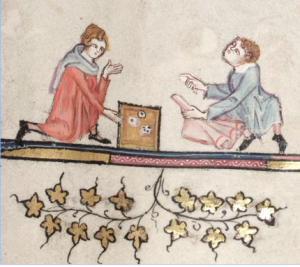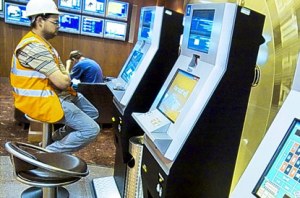#alosingbet
A recent edition of Channel 4’s investigative programme Dispatches had Michael Crick looking into the proliferation of betting shops on the country’s high streets. Viewing the show on 4OD I was struck by how closely the anxieties and prejudices voiced by Crick towards the betting industry mirrored the medieval attitudes towards gambling that were the subject of my academic research.
It would appear that mainstream society’s attitude towards gambling and gamblers (and that implied opposition in itself is worthy of interrogation) has changed little in 700 years. The compilers of medieval vernacular devotional manuals, governments (from the Parliaments of Edward IV to Gordon Brown) and Michael Crick are all similarly reluctant to denounce gambling as sinful or morally unacceptable whilst demonstrating a certain unease and distaste with regard the activity’s place in society.

Bone dice and shaker (c.14th C) from the Museum of London’s medieval collection. The gambling apparatus of choice back in the day.
The main villain of the Channel 4 piece was the fixed-odds betting terminal or ‘FOBT’, a sort of souped-up fruit machine that anyone who has been inside a bookies recently will recognize. These machines, featuring games like roulette and blackjack, allow the punter to wager alarming sums of money in a short space of time – dubbed the ‘crack cocaine’ of gambling, FOBTs are the most lucrative, but also most controversial, element of the high street betting market.
The medieval gambling world too had its bête noire: dicing. Whilst the gentry might bet on tournaments or, in the latter 15th century, card games, it was dicing – in particular the game ‘Hazard’ – that caused the most concern. Like the FOBT, dicing was accessible, relatively easy to learn to play, and fast.
Write this off as glib if you will, but I would like to draw some parallels between the betting world of Paddy Power and that of Chaucer’s Perkyn Revelour.
One of the key planks of Crick’s case against betting shops on the high street is that they are a focus for antisocial behaviour: drunkenness, drug-use, prostitution and general loutishness are all alleged to be encouraged by the presence of a Corals or Billy Hills. To prove the point, down Deptford High Street, the camera lingered on a special-brew connoisseur slumped in a doorway and various ne-er-do-wells milling outside a Ladbrokes. Interviewed for the programme, MP David Lammy argued that in a “civilized country” betting shops ought to be thought of like lap-dancing clubs or pornographers.
Look back to 14th century London and the anxieties surrounding gambling (predominantly dice play) are similar. Dicers are often mentioned in the same breath as prostitutes and tavern-dwellers, subcultures who “spend holy days in gluttony and waste and make their church the tavern” (from a 13th C treatise on the 10 Commandments). Gamblers, effectively, are damned by association with other apparently unwholesome groups.
Confessors’ Manuals advise priests against mixing with “hasadoures” or “rotoures” [revelers] in taverns and see gambling as a step on a path towards a lifestyle of vice. Without specific proscription of gambling from higher authority, censure falls on its purveyors’ perceived promotion of anti-social behaviour.

An unlucky dicer looks like he has lost the cloak off his back (Oxford, Bodleian Library, MS Bodley, 264, f.64r)
The second prong of Crick’s case was that bookmakers targeted less-affluent (i.e. poor) areas where unemployment was high and, as evidence, compared the number of betting shops in a crappy chav town (shit loads) and a limestone Cotswolds high street (one).
A couple of issues are in play here. Firstly, as was amply demonstrated by Crick’s tone of disapproval throughout, is the idea that frequenting betting shops is something an underclass of dole-munchers does and is not the activity of a decent chap. This anxiety is mirrored in several medieval conduct poems (How the Wise Man Taughte his Sonne, for example) that warn aspirant members of the mercantile middle class against falling in with dicers lest it besmirch their reputation.
Furthermore, we have the notion that gambling is a negative activity from an economic perspective. The Channel 4 documentary talks about betting shops draining money from local economies and sees the patronage of the unemployed as particularly pernicious. ‘Twas ever thus. One of the main findings of my research into the social function of medieval gambling was that dicing’s operation as a rival system of exchange to mercantile capitalism was a major source of the social anxiety surrounding the activity.
The antihero of Chaucer’s Cook’s Tale, Perkyn Revelour, is an avid dicer and is said to much prefer the company of his posse in the tavern to that of his master in his workshop. Dicing not only wastes time that the apprentice ought to spend working for his master, but also, in using a system of monetary exchange based on chance (rather than work or produce), represents a more wholesale challenge to the precepts of a mercantile economy.
Finally, as for the nice middle class kid who described how the escalation of his gambling habit led to him funneling thousands into FOBTs, I recommend he read The Tale of Beryn, an anonymous addition to The Canterbury Tales, in which a prodigal son loses everything pursuing his obsession with dicing.
Whether it be Dispatches or Piers Plowman, gambling is the site of significant social anxiety; the interesting thing is to probe, without prior prejudice, the nature of this anxiety.
Gambling has always had a whiff of the transgressive, afterall, that’s a central part of its appeal.
